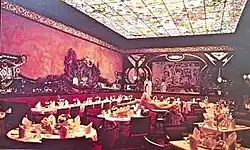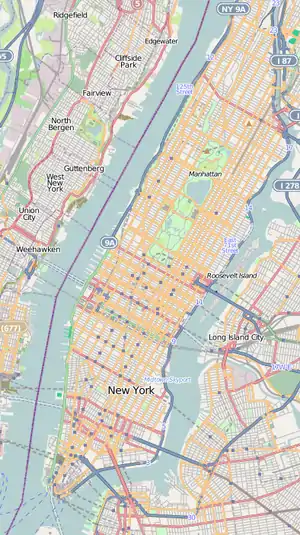Maxwell's Plum
Maxwell's Plum was a bar at 1181 First Avenue, at the intersection with 64th Street, on the Upper East Side of Manhattan in New York City. A 1988 New York Times article described it as a "flamboyant restaurant and singles bar that, more than any place of its kind, symbolized two social revolutions of the 1960s – sex and food".[1] Owned by Warner LeRoy, it closed abruptly on July 10, 1988.
| Maxwell's Plum | |
|---|---|
 Interior of Maxwell's Plum | |
 Location within Manhattan  Maxwell's Plum (New York City) | |
| Restaurant information | |
| Established | April 1, 1966 |
| Closed | July 10, 1988 |
| Previous owner(s) | Warner LeRoy |
| Street address | 1181 First Avenue (at 64th Street) |
| City | Manhattan, New York City |
| Postal/ZIP Code | 10065 |
| Country | United States |
| Coordinates | 40.762960°N 73.959770°W |
It was opened on April 1, 1966, by Warner LeRoy, son of Mervyn LeRoy the Hollywood producer (Wizard of Oz, Mister Roberts, Quo Vadis), it was initially part of his theater, providing a cafe with good wine lists and hamburgers for the 1960s swinging singles crowd.[2] It became a favorite gathering spot and within a few years the theater was closed in 1969 to expand the cafe with a luxury dining room reminiscent of Maxim's in Paris. Patrons enjoyed Maxwell's Plum mixed experience of a boulevard café or a second floor majestic restaurant that overlooked the first floor singles' bar. Maxwell's Plum rose rapidly to be one of the city's top venues grossing over $5 million by the 1970s, equivalent to $20 million when adjusted for inflation, with alcohol sales contributing more than a third.[3]
It was famous for its eclectic menu ranging from chili and hamburgers to wild boar and caviar, along with its first class service without snobbery and "outlandish Art Nouveau decor – kaleidoscopic stained-glass ceilings and walls, Tiffany lamps galore, a menagerie of ceramic animals, etched glass and cascades of crystal."[1]
Warner Leroy had two original Toulouse Lautrec paintings in frames screwed into the hall wall leading from mezzanine to upstairs toilets. Two large Tiffany lamps hung over the 2 large tables on the mezzanine level, three steps up from the floor level bar & sitting area. This was during the 1st phase of Maxwell's Plum.
It soon served over 1,200 customers a day, including such celebrities as Richard Rodgers, Cary Grant, Bill Blass, Barbra Streisand and Warren Beatty, and becoming what The New York Times called "a favorite watering hole for the 'swinging singles' set."[1] Other celebrities included: Myrna Loy, Buddy Hackett, NY Giants football players (who sat on 2nd floor area), and Vince Edwards (who played Dr Ben Casey).
A second location opened in 1981 San Francisco, California, at a cost of $7 million,[4] then soon closed. LeRoy built Potomac, a similarly themed 850-seat restaurant in Washington, D.C., the largest in the city's history, which also closed soon after opening at a cost of $9 million.[5]
LeRoy closed the Plum in 1988 when he sold the First Avenue building. In January 1989, the furnishings and contents of Maxwell's Plum were auctioned off.[6] At the auction, the Tribeca Grill acquired the Plum's large island bar.
References
- Miller, Bryan (July 11, 1988). "Maxwell's Plum, a 1960s Symbol, Closes". The New York Times. Archived from the original on March 6, 2016. Retrieved October 7, 2012.
- "The Former Maxwell's Plum". Right Here NYC. 12 November 2011. Archived from the original on 19 January 2013. Retrieved 11 January 2013.
- Miller, Bryan (July 11, 1988). "Maxwell's Plum, a 1960s Symbol, Closes". The New York Times. Archived from the original on October 7, 2016. Retrieved February 11, 2017.
- King, Wayne (May 13, 1981). "Maxwell's Plum opens in San Francisco". The New York Times. Archived from the original on March 4, 2016. Retrieved February 11, 2017.
- Asimov, Eric (February 24, 2001). "Warner Leroy, Restaurant Impresario, Is Dead at 65". The New York Times. Archived from the original on March 5, 2016. Retrieved February 11, 2017.
- Barron, James (January 13, 1989). "Last Mob at Maxwell's Plum Bids on Glass and Menagerie". The New York Times. Archived from the original on September 12, 2014. Retrieved February 11, 2017.